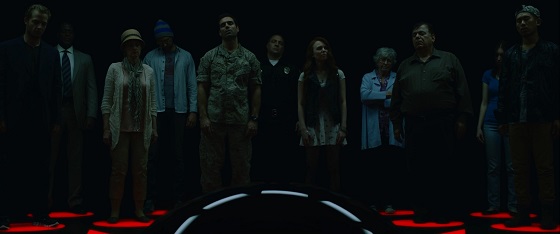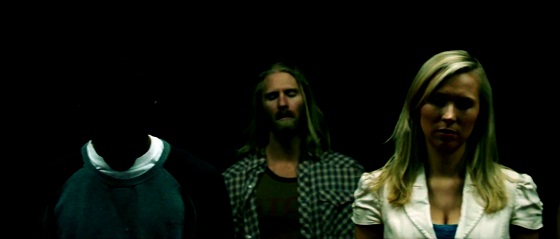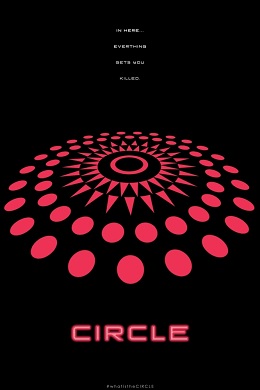A spooky mind-fuck suspense drama reminiscent of The Twilight Zone (or more recently, the BBC’s superb Black Mirror series), Circle hits its marks more often than not, and only rarely stumbles. Right off the bat, the movie tosses the audience into the void of the unknown right alongside the featured characters, who emerge from the pre-credit darkness observing a crowded room full of strangers. Each of these 50 strangers stands on a red circle not more than two feet in diameter, and are arranged in a larger grouping that is likewise circular. After a handful of deaths, the men and women realize that they are trapped in-place by an impersonal device, which sits in the middle of the room and zaps/kills people if they move outside their personal sphere. It gets worse, though: every few minutes, a countdown is initiated that forces the group to vote for a sacrificial victim lest a random one is chosen for them.
Circle continues thus, and is almost entirely devoted to the drama that unfolds when a group of economically, generationally, socially, and religiously diverse people come to grips with the shared-responsibility of each other’s very existence. The film does a good job pushing past the exposition phase to set things up, yet doesn’t take any shortcuts in terms of pushing its narrative forward. There aren’t any central characters to speak of, and there certainly isn’t a clear-cut protagonist to follow so that an over-arching theme can be drawn out as a guidepost of sorts. No, this is a movie about a bunch of scared strangers that are forced to single out a sacrificial lamb every two minutes: period.
 It’s a fascinating premise, and is explained away in vague terms by the characters themselves, who realize that a recent extraterrestrial encounter probably had something to do with their predicament. Yet the conflict of Circle speaks to a broader matter relevant to all of humanity: chiefly, the ability of mankind to reconcile our resources and capabilities with our desires. Every human being of the planet Earth shares at least one thing in common: the fact that we all inhabit the same world. If all of humanity was put in a circle and required to kill off others so that each individual’s needs were met, we might make different decisions about how we use water, food, oil, and other resources.
It’s a fascinating premise, and is explained away in vague terms by the characters themselves, who realize that a recent extraterrestrial encounter probably had something to do with their predicament. Yet the conflict of Circle speaks to a broader matter relevant to all of humanity: chiefly, the ability of mankind to reconcile our resources and capabilities with our desires. Every human being of the planet Earth shares at least one thing in common: the fact that we all inhabit the same world. If all of humanity was put in a circle and required to kill off others so that each individual’s needs were met, we might make different decisions about how we use water, food, oil, and other resources.
On the other hand, being forced to witness the consequences of our selfish behaviors might not change a damn thing, and Circle definitely toys with this idea. After all, human beings are animals when it comes right down to it, and any creature that is cornered tends to fight with a savage desperation that leaves little room for a conscience or morals. As the film plays out, the people in the dark room quickly come to terms with difficult concepts, like whether the elderly, sick, or disabled are more expendable than others. Indeed, if people have to continue dying, shouldn’t those with an already-abbreviated life-span be the first to go, if only so that the others can buy time to figure out a possible alternative course of action?
 As the strangers learn the dynamics of the voting system, and take turns making arguments for their own utility, and the expendability of others, the best and worst of the group bubbles up to the surface. This is a wholly absorbing thing to witness, yet it is also one of the limitations of Circle, which is almost entirely devoted to the debate among the strangers over who will live and who will die. Circle doesn’t give its audience much in the way of a breath of fresh air, for its setting is static, and the meat of the picture is wholly devoted to the struggle to determine the fate of the fifty, and nothing else. And while this seems to be a deliberate choice, likely due to budgetary constraints (just one set, no alien costumes or make-up) as well as for a more concentrated thematic focus, it gives the picture just one note to trumpet.
As the strangers learn the dynamics of the voting system, and take turns making arguments for their own utility, and the expendability of others, the best and worst of the group bubbles up to the surface. This is a wholly absorbing thing to witness, yet it is also one of the limitations of Circle, which is almost entirely devoted to the debate among the strangers over who will live and who will die. Circle doesn’t give its audience much in the way of a breath of fresh air, for its setting is static, and the meat of the picture is wholly devoted to the struggle to determine the fate of the fifty, and nothing else. And while this seems to be a deliberate choice, likely due to budgetary constraints (just one set, no alien costumes or make-up) as well as for a more concentrated thematic focus, it gives the picture just one note to trumpet.
Fortunately, Circle plays that note exceptionally well. Structurally, it toys around with the five stages of death a bit, going from denial, to anger, to bargaining, only to then dip its toe in depression before ending up at acceptance. It also plays on a number of relevant social factors like racial bias, LGBT-fear-mongering, class warfare, and ageism. Circle also takes a few surprising turns, like when factions start to break out amongst the strangers, pitting nihilistic realists against the moral idealists. The only constant through it all is the ominous, unseen clock forcing the action every two minutes, whether or not the strangers have come to a decision and are ready to vote.
It’s a tense ride, to be sure, and is only occasionally slowed by somewhat clunky acting here and there. Co-directors Aaron Hann and Mario Miscione do a good job parsing out the more verbose roles to capable actors, yet because there are so many characters that float into the film for just a few lines prior to their zapping/death, a handful of the performances come off as a bit stilted. None of this is enough to draw the audience out of the film, however, which clicks along at a savage pace towards a somewhat unexpected conclusion. Currently playing at this year’s Seattle International Film Festival, fans of dark, twisted, mean-spirited Sci-Fi could do a hell of a lot worse than Circle.






{ 3 comments }
fuck you and your film i didnt even know what the fuck happend in the end …………. what then haaaaa?? whhat nexxxxxxxxt????????????????????????????????????????????????????????????????????????
Same bro ikr
Great review!! Loved the movie.
Comments on this entry are closed.